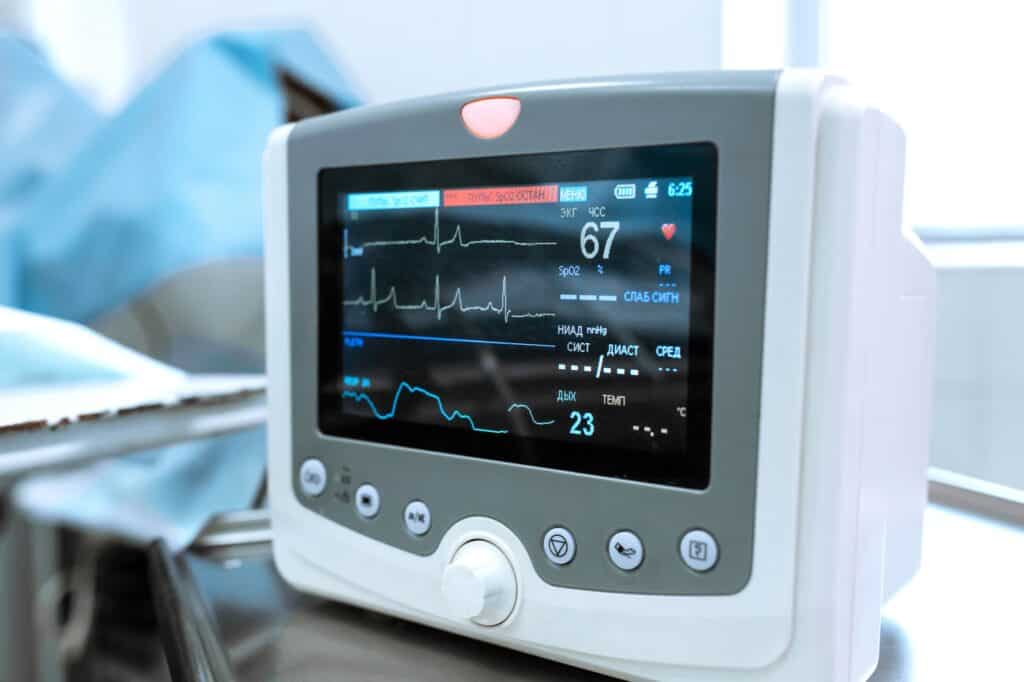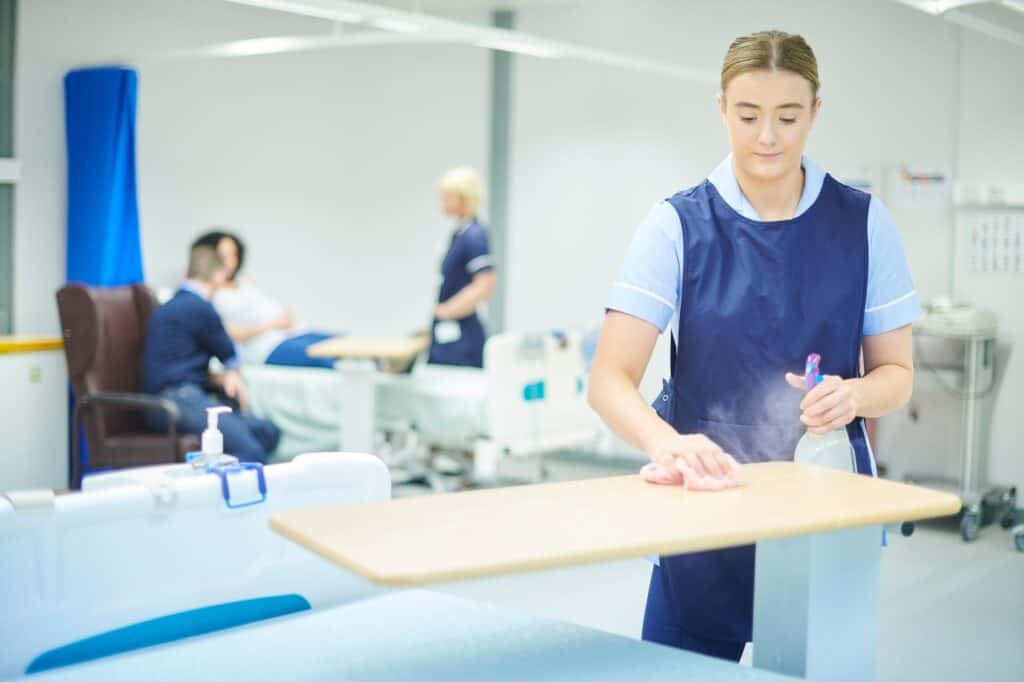23 Best Jobs for Nursing Students (Find The Right Fit)
As a nursing student, you may be wondering what the best jobs for nursing students are outside of your classroom and clinicals. There are many paths you can take, and they all come with unique advantages that can help you gain experience and advance your career.
In this blog post, we will discuss some of the top job opportunities that are especially suitable for nursing students. We’ll take a closer look at 23 different jobs, providing insights into the key advantages of each one. From certified nursing assistants (CNAs) to research assistants you’ll find a job that works for you and your interests.

Many of these job opportunities provide nursing students with on the job training and the flexibility needed to balance their studies and other commitments.
All you need is your trusty laptop and an internet connection to get started on your job search. So keep reading to discover the right job choice to develop your knowledge and skills in the healthcare field.
What are the best jobs for nursing students
The best student nurse jobs will depend on your individual interests, skills, and availability. But generally speaking, many nursing students are interested in jobs that can provide them with the ability to prioritize their studies, gain practical experience, as well as an opportunity to grow and develop their knowledge.
Here are our top picks for jobs for nursing students:
1. Nursing Assistant

Working as a nursing assistant is an excellent starting point on the path to your first nursing job. These positions offer practical experience in a healthcare setting, enabling you to develop essential skills and gain firsthand knowledge of patient care. Nursing assistants often work closely with registered nurses and licensed practical nurses in providing support for activities of daily living, such as bathing, dressing, and feeding patients.
This role allows you to develop strong communication and interpersonal skills, while also building empathy and compassion for patients. Nursing assistants generally work in long-term care and assisted living type facilities.
Average base salary: $19.68
Advantages of working as a nursing assistant:
- Practical experience in a healthcare environment
- Exposure to various patient populations and healthcare settings
- Opportunity to learn from experienced healthcare professionals
- Enhances communication and patient care skills
- Builds a solid foundation for a future nursing career
2. Patient care technician
Becoming a patient care technician (PCT) is another great job for nursing students who are looking to gain more experience in a medical setting while finishing their degree. PCTs typically receive more training than nursing assistants and are able to perform tasks such as drawing blood, inserting intravenous catheters (IVs), changing simple dressings, and administering EKGs.
They may also conduct point-of-care tests such as pregnancy tests and glucose finger-sticks. This position allows you to hone your technical skills and gain experience in a clinical setting. Patient care technicians often work in hospitals and clinic settings, under the supervision of nurses.
Average base salary: $19.50
Advantages of working as a patient care technician:
- Gain a comprehensive knowledge of advanced medical procedures
- Increase technical skills in handling and operating various medical equipment
- Learn how to interpret patient data and develop greater assessment skills
- Provide a more comprehensive level of patient care support
- Build experience in a medical setting for a future nursing career
3. Certified nursing assistant
A certified nursing assistant (CNA) is a healthcare professional who has completed additional training and passed an exam to earn their certification. CNAs typically provide basic patient care and services, including assisting with activities of daily living (ADLs), turning or moving patients, and recording food intake and waste output measurements.
They may also obtain vital signs and perform simple dressing changes. This position can provide you with valuable clinical experience. Certified nursing assistants typically work under the supervision of nurses in long-term care facilities, nursing homes, as well as hospitals.
Average base salary: $19.68
Advantages of working as a certified nursing assistant:
- Gain additional training and certification to further your knowledge in the healthcare field
- Learn how to care for patients in a variety of settings
- Develop advanced assessment skills and technical abilities
- Gain experience working under the guidance of nurses
- Provide quality patient care and build a strong foundation for your nursing career
4. Medical assistant

If you’re looking for a job in the healthcare industry that allows you to work in an outpatient setting, then becoming a Medical Assistant (MA) may be the perfect choice for you. An MA is a healthcare professional who provides administrative and clinical support to physicians and other medical staff in outpatient facilities such as doctor’s offices, urgent care centers, and clinics.
MAs have a broad range of responsibilities, including obtaining vital signs, performing phlebotomy, administering EKGs, preparing patient rooms, and sending/receiving medical records. This role offers nursing students the opportunity to gain practical experience in an office setting.
Average base salary: $18.55
Advantages of working as a medical assistant:
- Gain experience in an outpatient setting
- Learn how to manage administrative and clinical duties
- Develop an understanding of medical terminology and coding
- Increase communication skills with patients and medical staff
- Build experience that can be used in a variety of nursing roles.
5. Hospice care assistant or aide
A job as a hospice aide is a rewarding and challenging opportunity suitable for nursing students who have a strong sense of empathy and compassion. Hospice aides provide end-of-life care to people with terminal illnesses, supporting them physically, emotionally, and spiritually.
Aides primarily work in long-term care settings but can also work for hospice care agencies and travel to different facilities to visit their patients. This job can provide you with invaluable experience in end-of-life care.
Average base salary: $18.92
Advantages of working as a hospice care assistant:
- Gain experience in an environment focused on patient comfort and quality end-of-life care
- Provide emotional and spiritual support to patients and their families
- Increase communication skills with medical staff, patients, and families
- Develop an understanding of end-of-life care
- Gain experience in a diverse healthcare setting
6. Psychiatric aide or mental health technician
Working as a psychiatric aide or mental health technician is a great opportunity for nursing students who want to specialize in psychiatry. Psychiatric aides/mental health technicians are healthcare professionals who provide support and care to patients in a mental health facility or behavioral health units within a hospital.
These aides can assist with activities of daily living (ADLs), turning or repositioning patients, and obtaining vital signs. In addition to this, you may also help patients develop coping skills and run groups that help patients build skills in communication, problem-solving, and relaxation. This role can provide invaluable experience for you if you’re interested in working in the psychiatric field.
Average base salary: $18.57
Advantages of working as a psychiatric aide or mental health technician:
- Gain experience in a specialized psychiatric setting
- Learn how to assist patients with their mental and emotional needs
- Develop an understanding of different disorders and treatments
- Provide a more comprehensive level of patient care
- Gain experience that can be used in many psychiatric nursing roles
7. Summer camp nurse assistant

This position offers nursing students the opportunity to gain valuable experience working with children. Summer camp nurse assistants typically work under the direction of a supervising nurse and provide care for campers ages 7-18. They can assist with tasks such as administering first aid care and teach campers about important health topics such as proper hand hygiene.
Depending on the camp, such as one for children with disabilities duties may also include helping with ADLs, and obtaining vital signs. This can be a rewarding job if you’re passionate about working with children and helping them grow through meaningful experiences.
Average base salary: $14.15
Advantages of working as a summer camp nurse assistant:
- Gain experience working with children in a unique setting
- Learn how to administer first aid care in emergency situations
- Increase communication skills with children, families, and medical staff
- Gain an understanding of different age groups and their needs
- Gain valuable experience that can be used in a variety of nursing roles
8. Home health aide
Working in home healthcare is an excellent job opportunity for nursing students seeking flexibility, autonomy, and the ability to work one-on-one with patients. Home health aides work in clients’ homes, providing basic healthcare services such as wound care, medication administration, and assistance with daily living activities.
You must be able to recognize changes in a patient’s condition and report these changes to the nurse or physician. Collaboration with other disciplines often takes place via computer or telephone.
Average base salary: $15.63
Advantages of working as a home health aide:
- One-on-one patient interaction and individualized care
- Development of critical thinking and decision-making skills
- Exposure to patients’ home environments and community healthcare
- Enhances adaptability and resourcefulness
- Opportunity to build strong patient relationships
9. Rehabilitation aide or assistant
Rehab aides or assistants provide support to physical, occupational, and speech therapists in rehabilitation settings. They help facilitate exercise programs and therapy routines under the direction of the therapist, as well as monitor patient progress and document patient care.
You may also assist with patient transfers, prepare equipment for therapy sessions, and provide therapeutic exercises. Though not directly involved in patient care tasks, job responsibilities will provide you with valuable experience to build upon for those interested in rehab nursing.
Average base salary: $14.66
Advantages of working as a rehabilitation aide or assistant:
- Learn therapy principles and techniques that can be applied to nursing practice
- Gain experience in a specialized rehabilitation setting
- Develop an understanding of different disabilities and conditions
- Increase communication skills with therapists, patients, and families
- Gain experience that can be used in many rehab nursing roles
10. Cardiac telemetry monitor technician

Cardiac telemetry monitor technicians are healthcare professionals who observe and monitor patients with cardiac conditions. They work in hospitals or clinics and use specialized equipment to monitor a patient’s heart rhythm and rate.
They must be able to recognize abnormal readings and report these changes to the nurse or physician. This job may not offer a lot of patient care opportunities, but it can provide you with an excellent opportunity to gain experience in a specialized cardiac setting.
Average base salary: $21.85
Advantages of working as a cardiac telemetry monitor technician:
- Gain experience in a specialized cardiac setting
- Develop an understanding of different heart problems and treatments
- Increase knowledge of cardiac monitoring equipment and techniques
- Understand the importance of early detection of cardiac issues
- Gain experience that can be used in many cardiac nursing roles
11. Phlebotomist
A phlebotomist is a healthcare professional who collects blood samples for testing. Phlebotomists typically work in laboratories, hospitals, or clinics and must be familiar with a variety of equipment and techniques.
They also need to understand infection control standards and have excellent people skills in order to interact with patients. This job provides you with the opportunity to gain valuable experience in a medical setting while learning how to perform basic laboratory procedures.
Average base salary: $19.13
Advantages of working as a phlebotomist:
- Gain experience in a medical setting
- Develop an understanding of different collection techniques and equipment
- Gain knowledge of infection control standards
- Increase communication skills when talking to patients about their procedure
12. Patient safety companion or sitter
This position involves providing companionship and safety monitoring for patients who need supervised care. Patient safety sitters typically work in hospitals or long-term care facilities and must be able to recognize changes in a patient’s condition.
They may also help with vital sign checks, toileting, and ambulation assistance. This job offers you a great experience and insight into the nursing field for those looking to gain a better understanding of patient care.
Average base salary: $15.29
Advantages of working as a patient safety companion/sitter:
- Learn about different safety measures to keep patients safe, such as bed alarms
- Gain experience providing one-on-one patient care
- Increase communication skills when interacting with patients
- Learn how to recognize changes in a patient’s condition
- Gain valuable insight into the nursing profession
13. Patient transporter

Patient transporters are responsible for transporting patients from one area of the hospital or clinic to another, such as from the examination room to x-ray or from the emergency room to a patient room. This job often requires working with all types of patients, from newborns to elderly individuals.
To transport patients safely, you must be able to operate a variety of transport equipment, use proper transfer techniques, and communicate with patients and their families. This job can provide you with a great opportunity to gain experience in a patient care setting.
Average base salary: $16.04
Advantages of working as a patient transporter:
- Gain experience with basic patient care skills, such as transfer techniques
- Interact with a variety of patients and their families
- Develop an understanding of the hospital environment and processes
- Increase communication skills when talking to patients and their families
14. Hospital clerk or medical receptionist
Hospital clerks and medical receptionists typically work in healthcare settings such as hospitals or clinics. Hospital clerks are generally responsible for transcribing doctor’s orders, maintaining par levels of supplies, reconciling charges, performing unit audits, facilitating communication between staff members, and ensuring patient identification is correct.
Medical receptionists typically greet visitors, verify insurance information, schedule appointments, collect payments, and other clerical tasks. Both must have excellent customer service skills as they are often the first point of contact for patients, visitors, and staff. You can gain experience in a healthcare setting and learn valuable communication and customer service skills by obtaining either one of these positions.
Average base salary: $16.69
Advantages of working as a hospital clerk or medical receptionist:
- Gain experience in a healthcare setting
- Develop customer service skills
- Understand the various clerical tasks involved in a clinic/hospital setting
- Increase communication and problem-solving skills
- Gain knowledge of healthcare regulations and policies
15. Medical interpreter or translator
Medical interpreters and translators are responsible for providing language assistance to patients, families, and healthcare providers. Medical interpreters must be fluent in at least two languages, including English, and must have a good understanding of medical terminology.
Medical translators are responsible for translating written documents from one language to another. They work in hospitals, clinics, and other medical settings. If you’re a bilingual nursing student or foreign exchange student, these jobs may be a great fit as they provide an excellent opportunity to combine language and healthcare skills.
Average base salary: $28.96
Advantages of working as a medical interpreter or translator:
- Gain experience in a healthcare setting with the opportunity to use language skills
- Develop an understanding of medical terminology and concepts
- Increase language proficiency in two languages
- Learn how to interpret important medical information accurately for patients and their families
- Help patients gain health literacy by providing clear explanations of medical information
16. Medical scribe

Another job opportunity suitable for nursing students is working as a medical scribe. A medical scribe works alongside a physician, taking notes on patient visits, documenting symptoms, and maintaining patient records. Medical scribes also assist with updating patient histories and organizing and sending documents to the physician for review.
They typically work in medical offices, hospitals, or clinics and must be accurate and have good listening skills. Working as a medical scribe provides you with exposure to different healthcare specialties, which can help you choose a focus area for your nursing career.
Average base salary: $15.35
Advantages of working as a medical scribe:
- Observational experience alongside physicians
- Insight into medical decision-making and healthcare workflows
- Exposure to various medical specialties
- Enhances organizational skills
- Opportunity to expand medical knowledge and terminology
17. Lab assistant
A lab assistant is responsible for performing routine laboratory tests and procedures. They work in medical facilities such as hospitals, clinics, and doctor’s offices. Lab assistants may also collect specimens from patients, prepare samples for testing, and assist with results interpretations.
This position requires good organizational skills and an understanding of basic laboratory equipment and procedures. While you won’t get much patient interaction with this position, it is a great way to gain experience in the clinical aspects of healthcare.
Average base salary: $19.22
Advantages of working as a lab assistant:
- Gain experience with laboratory techniques
- Develop an understanding of medical terminology related to laboratory results
- Increase knowledge of medical conditions and diseases
- Understand the importance of laboratory results in patient care
18. Medical records technician
Medical records technicians are responsible for maintaining and organizing patient information, such as medical histories, test results, treatments prescribed, and insurance information. This job requires accuracy, attention to detail, and strong technical skills as medical records technicians must use various software programs to store and organize patient information.
This position doesn’t provide much direct patient interaction, but it does provide you with the opportunity to learn the importance of accurately maintaining patient information.
Average base salary: $16.84
Advantages of working as a medical records technician:
- Gain experience in a healthcare setting
- Develop an understanding of patient medical records
- Understand the importance of accuracy when maintaining medical records
- Increase knowledge of medical terminology and legal requirements
- Learn the importance of patient confidentiality
19. Research assistant

Working as a research assistant in healthcare settings offers college students the chance to contribute to medical research projects and clinical trials. This role involves data collection, literature reviews, and collaboration with researchers and healthcare professionals.
By engaging in research activities, you can develop analytical and critical appraisal skills while gaining a deeper understanding of evidence-based practice. Research experience can also open doors to advanced nursing roles or academic careers in the future.
Average base salary: $17.26
Advantages of working as a research assistant:
- Gain experience in a research setting
- Understand the importance of evidence-based practice
- Develop analytical and critical appraisal skills
- Increase knowledge of medical terminology and research methods
- Contribute to advances in healthcare
20. Medical equipment technician
Medical equipment technicians are responsible for maintaining and preparing medical equipment for use. This includes sterilizing instruments, processing equipment, operating sonic washers and autoclaves, organizing surgical instrument trays, conducting sterilizer tests and recording results, and stocking crash carts.
They must be accurate and knowledgeable of medical equipment and safety protocols. Working as a medical equipment technician provides you with the opportunity to observe how medical equipment is used in a healthcare setting.
Average base salary: $17.39
Advantages of working as a medical equipment technician:
- Use technical skills to maintain medical equipment
- Develop an understanding of medical devices and safety protocols
- Increase knowledge of infection control and sterilization processes
- Gain exposure to medical logistics and supply chain management
21. Volunteer at a healthcare facility or clinic
Volunteering at a healthcare facility or clinic is an excellent way for nursing students to gain experience in the healthcare field and make a positive impact on their community. You may be able to shadow a doctor or nurse, assist with patient care, or help out with administrative tasks.
Plus, volunteer experience looks great on a resume and can open the door to other job opportunities. If you don’t need the cash, consider volunteering as a way to get involved in the medical field and gain experience.
Average base salary: unpaid, possible stipends
Advantages of volunteering at a healthcare facility or clinic:
- Gain valuable insight into the healthcare system
- Observe healthcare professionals in action
- Develop interpersonal and communication skills
- Increase knowledge of medical terminology
- Make a positive impact on the community
22. Environmental services technician

Environmental services techs are responsible for maintaining the cleanliness and safety of healthcare facilities. This role involves cleaning patient rooms, bathrooms, waiting areas, and other areas of the facility.
It also involves disposing of medical waste, setting up medical equipment, stocking supplies, and changing linens. If you want less patient contact while still gaining hands-on experience in a healthcare setting, this is an excellent opportunity to explore.
Average base salary: $17.50
Advantages of working as an environmental services tech:
- Develop knowledge of infection control and medical waste disposal procedures
- Gain experience with medical equipment and supplies
- Increase knowledge of healthcare operations and roles
- Contribute to the overall safety and cleanliness of a healthcare facility
23. Dietary aide

Dietary aides are responsible for providing meals and snacks to patients, preparing and serving food, cleaning the kitchen and dining areas, running errands, and stocking supplies.
Working as a dietary aide provides nursing students with the chance to develop an understanding of nutrition and dietetics while gaining valuable interpersonal skills. This job requires strong communication and organizational skills as you will be interacting with both patients and healthcare staff throughout the day.
Average base salary: $13.77
Advantages of working as a dietary aide:
- Develop knowledge of nutrition and dietetics
- Gain experience in food service and healthcare operations
- Learn the importance of nutrition for patient health
- Develop interpersonal and communication skills
Other Jobs for Nursing Students to Consider
In addition to the opportunities listed above, there are a number of other jobs for nursing students to consider. These positions typically require additional qualifications beyond a high school diploma such as certifications or degrees, which can take you some time and cost money to obtain. Some of these positions include:
1. Emergency medical technicians (EMT)
Average base salary: $19.74
Provide life-saving care to patients who have experienced medical emergencies.
2. Surgical technician
Average base salary: $47.51
Assist surgeons during operations by preparing the operating room, ensuring patient safety, and passing instruments to the surgeon.
3. Pharmacy technician
Average base salary: $18.45
Assist pharmacists in dispensing medications and providing drug information to patients.
4. Occupational therapy aide
Average base salary: $18.48
Provide support and assistance with occupational therapy programs, assisting both the patient and therapist as needed.
5. Health Educator
Average base salary: $23.08
Develop and implement health education programs to help individuals or communities prevent or manage illnesses and injuries.
6. Medical Billing and Coding Specialist
Average base salary: $19.10
Are responsible for coding patient information and submitting insurance claims to ensure patient bills are accurate.
By exploring these jobs, you can gain valuable experience and insight into the medical field. With the right qualifications or certifications, they can open up a world of opportunities and gain the skills necessary to succeed in your career.
Is it possible to work while in nursing school?
Yes, it is possible to work while in nursing school. Working a part time job or even full-time while in nursing school can help you gain invaluable experience in a healthcare setting as well as provide some extra income. Employers understand that nursing students have demanding schedules and may be willing to work around your class and clinical commitments.
In addition, many employers may offer tuition reimbursement or other benefits to help you cover the cost of your nursing program. With careful planning and time management, you can make working while in nursing school a reality.
What’s the best shift to work while in nursing school?
The best shift to work while in nursing school depends on your individual needs and preferences. You should consider your other commitments, such as classes and clinicals, and determine what hours work best with your schedule.
Many healthcare facilities offer flexible shifts such as evening or weekend schedules. Employers also offer part-time or per diem positions that may be more suitable for you if you have limited availability.
Wrapping up
Working while in nursing school provides students with invaluable experience and insight into what it’s like to be part of a healthcare team. Each job opportunity highlights different skill sets, making them suitable for nursing students of different interests and personalities. Explore these nursing job opportunities as a stepping stone towards a successful career in healthcare.







